About Mayendit
Mayendit is one of the nine counties in Unity state of South Sudan. It borders Leer to the east, Koch to the north, and Payinjiar to the south. Seasonal flooding has been reportedly increasing in the County since 2019 up to 2023, with perennial occurrences affecting 347 of the 363 villages. In 2021, a total of 59,356 individuals (8,840 households) were displaced by floods, while in 2022 a total of 17,000 individuals (2,833 households) were newly displaced, bringing the number of internally displaced people in the county as a result of floods to 39% of the population.
Most health and water sanitation and hygiene (WASH) facilities, crops, and animals are submerged, heightening households exposure to food insecurity and health hazards. In Mayendit South, movement and delivery of services or supplies is nearly impossible, with small canoes made from the trunks of palm trees being the available means of transport. Leaders in the county listed maternity services and medical outreach as major needs.
The State of Health Care Services in Mayendit
There is no hospital in Mayendit County, with only Rubkuay Paediatric PHCC and Mayendit PHCC. These health centres are more than 4 hours walking distance from most of the population. Seven of the 14 health facilities in Mayendit are supported by International Medical Corps (IMC) under a funding from UNICEF and the World Bank. Coalition for Humanity (CH) in partnership with Concern Worldwide (CWw) is also implementing Boma Health Initiative (BHI) funded by the European Commission Humanitarian Aid (ECHO). Madol PHCC, Mirnyal PHCU, Puollual PHCU, Bhor PHCU, and Pantot PHCU are not supported by any humanitarian partner. The inaccessibility and emergency nature of funding has led to most partners prioritizing mobile response, which operates once a week and only offers outpatient services. This means that the community is underserved 6 days out of 7. A recent health assessment in the County found that only 5% of households lived within a 5-kilometer radius of a health facility. The remaining households had to travel further to reach a health facility, with the most common distances being 6-10 kilometres (45%), 11-20 kilometres (35%), and 21-40 kilometres (15%). With preflooding, canoes are the only means of transportation in some areas, which makes it difficult for people to access health care.
All of the assessed health facilities lacked laboratory equipment, functional toilets, and waste disposal incinerators. The only available services were outpatient care, consultation, and referral. These facilities also lacked the necessary professional capacity. Most of them were staffed by community health workers, and the few available clinical officers and doctors only visited the facilities on an occasional basis as part of mobile service delivery schemes.
Mayendit County does not have a health facility for sexual gender-based violence (SGBV) case management. Women who have been survivors of SGBV must travel to Leer County, which is far away. Coalition for Humanity has had difficulty securing transportation for survivors. Some survivors are not in good enough condition to travel long distances. None of the partners that implement gender-based violence (GBV) programs have transportation for survivors. Coalition for Humanity has had to secure an ambulance from Médecins Sans Frontières (MSF) Leer, which takes more than 72 hours to arrive in Mayendit. During the rainy season, the roads are impassable and survivors cannot access MSF Leer from Mayendit.
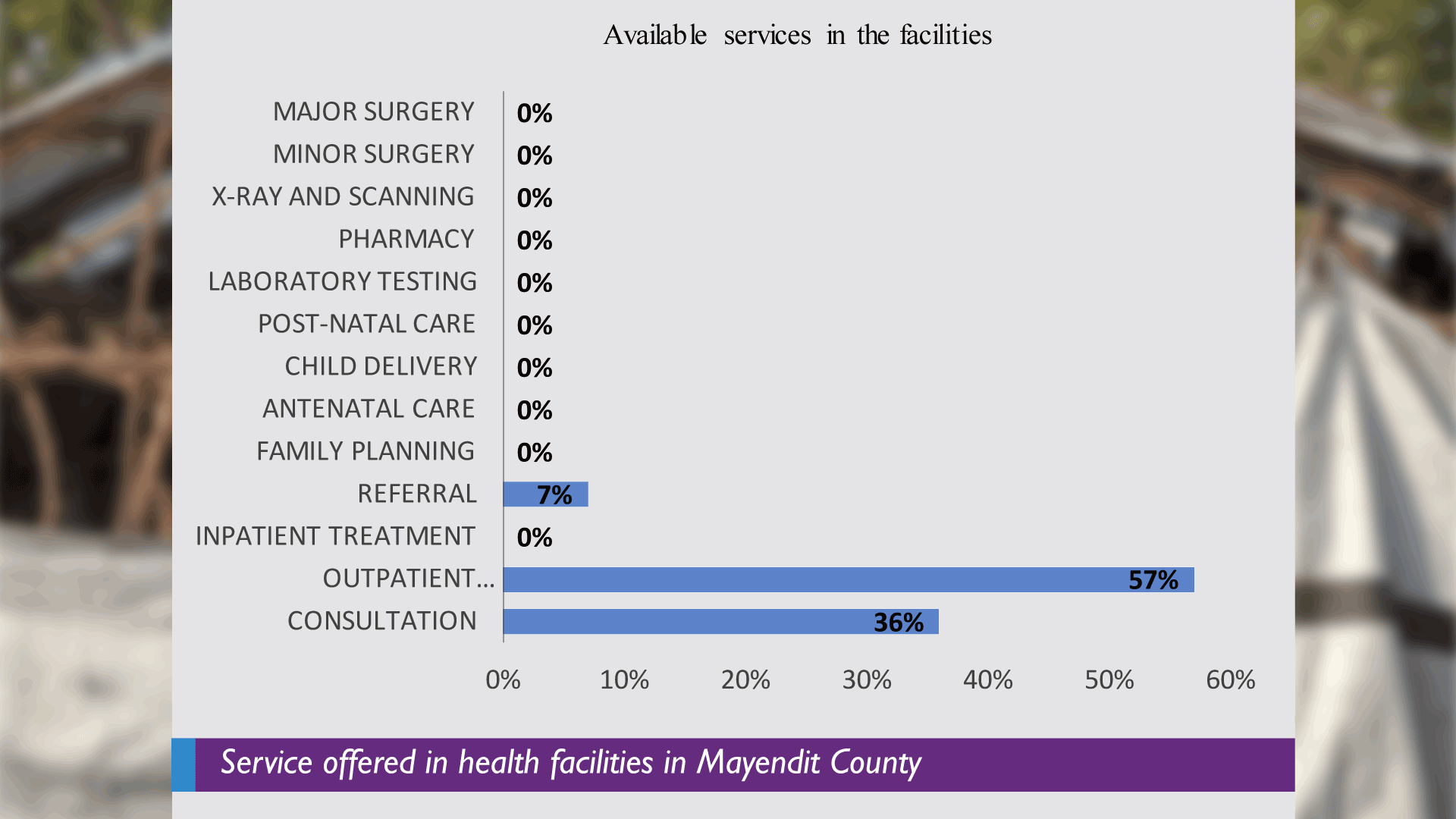
The Plight of Expectant Mothers
Childbirth and maternal health services are among the major health needs for the people in Mayendit County. Due to lack of services, 95% of the households had delivered children at home and only 5% delivered in a health facility. This can be attributed to unavailability of services at the health facilities, long distance to the facilities, and the mobile nature of the facilities that are operated once a week to serve outpatient treatment, without much focus on maternal health. This implies that the majority depend on traditional birth attendants for delivery, which presents a health risk to both the woman and the unborn child. Also, the cultural norms do not allow women to practice any form of family planning or taking contraceptives; husbands can assault women who fail to get pregnant.
Majority of the households in Mayendit, overwhelmingly 95%, have between 1-3 children who are below five years of age. A half of the households, who have children under the age of 2 years have stopped breastfeeding them. At least 35% of the households surveyed in the county have a malnourished or underweight child. At least (10%) of the households surveyed have lost an under 5-year old child to death, and 100% of these deaths are caused by Malaria. Further, 70% of the mothers and children do not attend postnatal clinics, 45% do not attend antenatal clinics, and at least 5% of the households surveyed had lost a woman during childbirth.
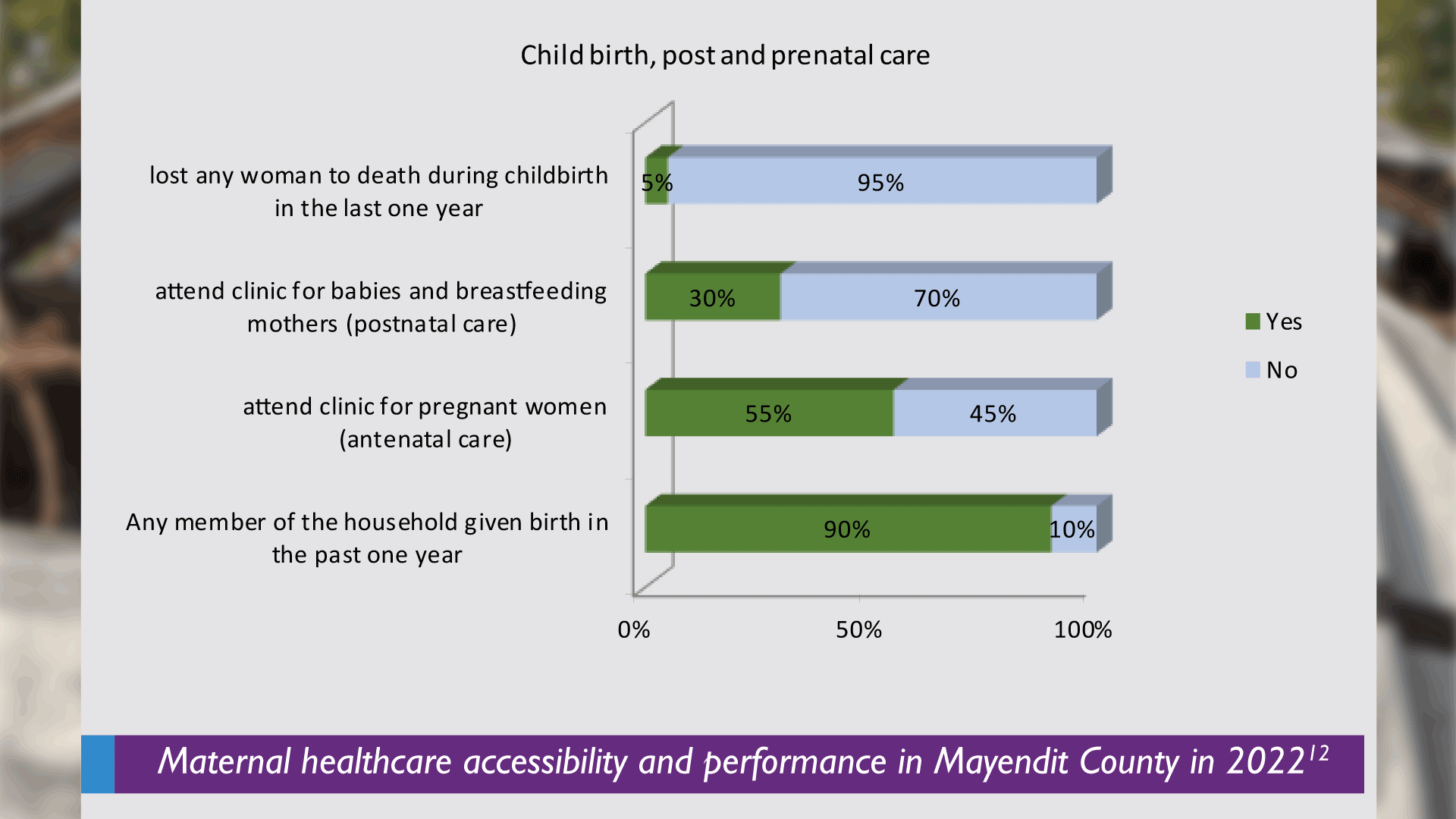
What Every Mother Deserves
Maternal health is vital to any society as it determines the well-being of the future generation; it refers to women’s health during childbirth as well as during the prenatal (pregnancy) and postnatal (after delivery) stages. Each stage of childbirth should be a positive experience, ensuring women and their babies reach their full potential for health and well-being. Pregnant mothers and new-borns can face a few health risks including excessive blood loss, infection, high blood pressure, and obstructed labour, as well as indirect risks such as anaemia, malaria, and heart disease, among other risks. These risks can be prevented with timely management by a skilled health professional working in a well-equipped health facility. Addressing the gap in health care services that affect health outcomes is fundamental to ensuring all women have access to quality maternal services.
The aim of the Sustainable Development Goals (SDGs) is to leave no one behind, but the women in Mayendit county are likely to be left out. Countries are expected to accelerate the progress in improving maternal health for all women. It is expected that by 2030, countries will reduce the maternal mortality ratio to less than 70 per 100,000 live births, end preventable deaths of new-borns and children under 5 years of age, ensure universal access to sexual and reproductive health-care services; including family planning, information and education, to achieve universal health coverage (access to quality essential health-care services and access to safe, effective, quality and affordable essential medicines and vaccines for all). The World Health Organization (WHO) Constitution (1946) envisages health as a human right and recognizes a legal obligation on states to ensure access to timely, acceptable, and affordable health care for its citizens. It also upholds that people are entitled to the right to a health system that gives everyone an equal opportunity to enjoy the highest attainable level of healthcare.
The Hope of Mothers in Mayendit County
In order to ensure safe motherhood, there is a need to rehabilitate the health facilities in Mayendit, upgrade the PHCC to hospital, upgrade the PHCUs to PHCCs, ensure qualified personnel and reliable medical supplies. People in Mayendit County believe that the government, humanitarian organizations, development partners, can enhance the state of the health facilities in terms of equipment and human resource capacity to ensure reliable delivery of vital services including antenatal, postnatal and child birth services, examination and prescription for common health threats such as malaria, and consultation and advisory services, especially on nutrition. The facilities also require adequate medical supplies, including stocked pharmacy to ensure effective care. The government and partners should also establish more health facilities to ensure more households are within close proximity and can easily access healthcare, especially maternal healthcare that can sometimes require urgent attention.
Coalition for Humanity joins hands with the people of Mayendit County to call upon the government, humanitarian organizations and development partners to upgrade health facilities from mobile to full-time operation and offer maternal health services, and laboratory and pharmacy services. The partners are also called upon to factor SGBV services during planning and upgrading of the facilities. The WHO Constitution (1946) advocates for meaningful participation by all national stakeholders – including non-state actors such as non-governmental organizations – in all phases of healthcare programming: assessment, analysis, planning, implementation, and monitoring and evaluation. This necessitates stakeholders to take urgent action to improve the health situation in Mayendit County and alleviate the plight of mothers and new bone babies.


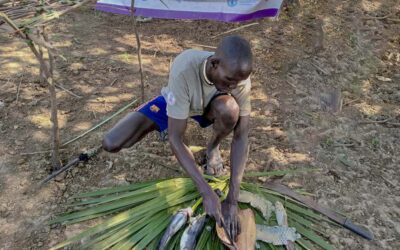
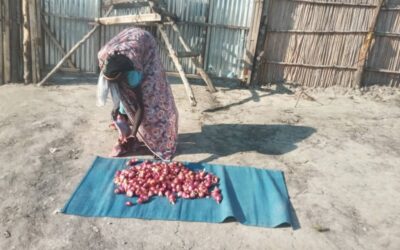
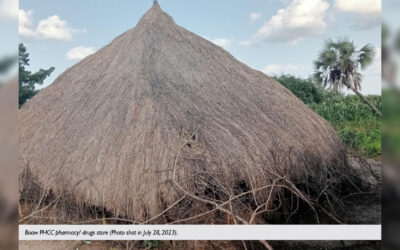
0 Comments